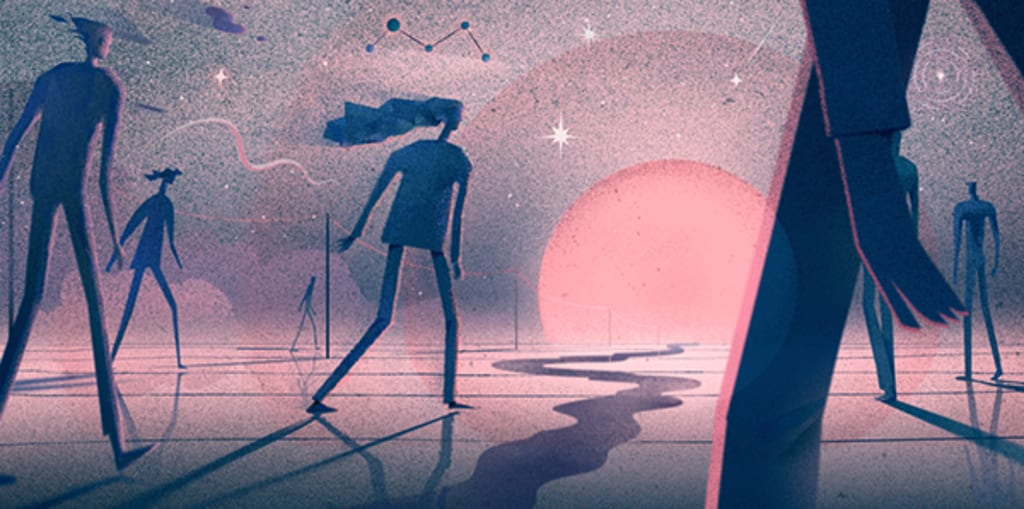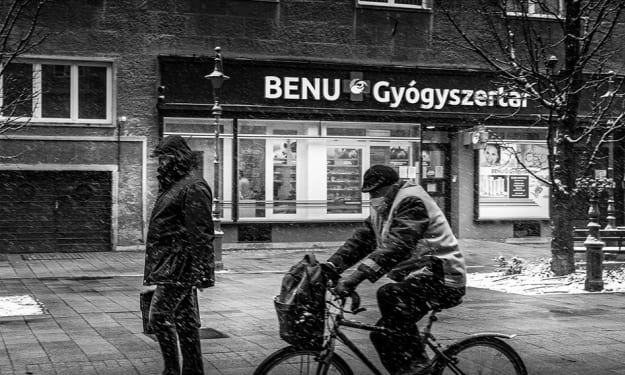The True Meaning of Life
Do you ever get paralyzed by the question of your existence and the meaning of life?

The need for meaning, the yearning for meaning, the search for meaning is universal. It's just instinctive that all of us at some point in some way, in some wording, ask this question, what's the meaning of life and what's the meaning of my life? I thought about it a lot. And I wrestled with it. Now, let me take a guess you very much have.
I've thought a little bit about life, and the meaning thereof. I grew up in a small town. And really, there weren't many opportunities to make money. And I started working quite young. So it was physical manual labor, and I hated it so much, and I was bad at it.
I did any work for anyone who would pay 50 cents an hour or a dollar an hour. So, most of it was particularly not fun, and physically very, very hard. But to me, the hardest part wasn't that I was small, and the stuff was physically hard. The hardest part was that I was just bored out of my skull. And that's when I started having these existential doubts about like, wow, if this is the path forward, and if this is the only path forward, I don't think I like this path very much.
I actually think, by the way, that these are teenager questions, before that, you're just trying to eat candy and have fun. And then you have this consciousness of yourself, and then you probably have some consciousness about the finite nature of life, etc.
After you’re a teenager, you know that life is meaningless. So you’re not pondering it anymore.
When I was that age, these questions seemed entirely fresh like I was the first person to think of them. I thought I had something of an epiphany that could be shared with others who hadn't thought about this, that the meaning of life was happiness. I'm no longer struggling in that existential way.
It's actually the great existential psychotherapist Viktor Frankl who wrote Man's Search for Meaning, which was a holocaust memoir. And it's like a philosophical treatise in one, what I've come to realize after reading, Man's Search for Meaning is that the meaning of life is not from pleasure. And it's not from distracting yourself with entertainment, it's having a purpose, and making something of your life where you can say, this is how it connects to other people. And in fact, there are several theories of happiness. And all of them have in common that there are multiple building blocks of happiness and meaning is a really important building block. And if you don't have that building block, if you don't feel like your life is part of something greater than yourself, and serve some larger purpose. It's very, very hard to be happy.
How modernity and all the technologies have changed or affected the way that the median person thinks about life and the meaning thereof
Some people, including Viktor Frankl, I believe, and certainly the Unabomber, for instance, have argued that modernity, technology, and a de-emphasis on family-centered societies, etc, have been adding to existential dread because it separates each of us from a meaningful life for the pursuit of a meaningful life. What do you think of that?
Okay, so first of all, if you were to take the Unabomber’s Manifesto, and clean up a few of the oddities.
The manifesto was quite clear and its already argument, that modernity that separated the human being from the world and from life, and it put up so many barriers, that his very reactionary solution was to remove the barriers and remove the people who created the barriers.
So for example, like we're not farming our own food, we're not getting our water from the stream. Yes.
And we're creating technologies that govern us that survey us that control us. Frankl also made the argument in a different context, talking about the Nazi war machine, and so on. That technology was removing a lot of the thought processes and decisions and relationships that had been a feature of humankind for millennia. So obviously, technology has benefits, but technology has costs.
It's a tempting hypothesis. And by the way, poor technology is the scapegoat. It's like, why are people unhappy technology, mice anxiety, increasing technology, since every ancient philosopher has also talked about how difficult it is to find meaning in life, it's certainly not unique to modern times. Has it gotten worse? I'm not sure. I think the only argument that I could make against technology is that it is so damn good. Like, there are so many amazing things that you do on your phone, even that it can distract you from wrestling with some existential questions, which are probably better to be wrestled with than distracted from, but I don't want to implicate technology as a whole as a source of lack of meaning, it doesn't seem to me to be a very strong argument.
Bill Damon is a psychologist at Stanford, and he studies purpose. And there may be some subtle distinctions between meaning and purpose. But they think they’re more the same than they’re not. So I’ll just use those interchangeably. And what Bill Damon does have data on is, when he interviews young people, he finds one in five has a very clear sense of purpose. He mostly works on adolescents. So we’re not fully sure whether that’s true among 60-year-olds. And by the way, in his definition, to have a sense of purpose, you have to be doing something that you’re not just talking about it. One of the elements of purpose that might be nonobvious, but I think is really important is that you can’t just throw yourself into some good work only because it’s obviously of moral consequence, like I should work on climate change. It’s the most pressing, you have to actually enjoy at some level, the purposeful work that you do. It’s so helpful because it doesn’t ask you to solve all the problems in the universe or even the most urgent problems in the universe, but if you can solve any problem in the universe and make a positive difference, then you’ll likely be happy and fulfilled person.
I would think that in some ways, an existential thought or even existential dread is a really useful signal because there is danger in the world, there's even evil in the world and to deny or hide from that is not a solution.
The upside of angst
Viktor Frankl wrote this memoir Man's Search for Meaning because he had been in Nazi concentration camps, not because he'd had a lovely Vienna childhood of playing violin and eating bonbons. So let's say you live in an environment that is not under threat of war or extreme poverty, etc. But that you are feeling existential dread.
Remembering the three important things that Frankl said toward the end of Man's Search for Meaning where he also talks about the patients that he sees in clinical practice. These are not people who are in concentration camps. These are people who are leading middle-class lives and nevertheless struggling.
Frankl said that you can find meaning in life by;
- doing something productive.
- The second was relationships. Many people find meaning in their close relationships with family or their friends.
- And then the third is to find meaning and suffering, which is, of course, so directly relevant to his personal experience in the concentration camps.
Notably, he didn't have a fourth thing which is like make meaning out of pleasure, make meaning out of easy life. So it's about how you respond to suffering, how you respond to adversity, and that you can make meaning in your life by, for example, your own character or the way that you treat others, even if you are mistreated, go to bed and feel proud of how you responded, even if you didn't change the overall evil that was happening.
So, one puzzling fact about suicide is that suicide not universally, but often tends to rise along with prosperity. This would seem to be puzzling, at least it was to me when I first began to read this literature. But it turns out that this is what one suicide-ologists call the,'no one left to blame' theory of life. If you live in very difficult circumstances, or have a very difficult personal situation, whatever, you can always imagine that things will get better and that you will be happier. Whereas if you have prosperity, and you see other people like you are thriving, and you're not, there is no one left to blame, when someone feels like there's not an obvious external explanation for their unhappiness, what the heck do you do?
Well, lack of meaning is absolutely a hallmark of depression. And when you are experiencing severe clinical depression, most medical professionals and most psychologists would absolutely say you should see a professional about antidepressants. But I think also most medical professionals, and most therapists and psychologists would say that the pharmaceuticals are in a way, just a break on the system, so that you can then actually open yourself up to doing the work of therapy.
I really think meaning is the experience of pursuing a goal that makes sense to you to pursue.
My dad’s no longer with us but he talked about retiring. For most of my childhood, he would just look forward to the day where he could, “do nothing”. And interestingly, it was when he retired that his depression got bad enough that he needed to see a psychiatrist. And I think many of us can identify with that having nothing to do is not Heaven, it is more like hell.
You will wrestle with the meaning of life, you will feel at times that your life has no meaning you will wonder what the heck you're doing. And there will be a time where you feel like you actually have some satisfying answers to those questions and you're no longer tortured.
Those existential thoughts can be seen as a feature of your life and not a bug. And they can be seen as something that is a signal to really consider how well you can contribute to this big world of which you are a tiny piece.
******** **************** **********************
Like what you read? Send me a gift below to help contribute to my next adventure!
You can also sign up for my mailing list here: https://bit.ly/3el7KKa
About the Creator
Blessing Akpan
I am a photographer of thoughts, let me capture your soul.






Comments
There are no comments for this story
Be the first to respond and start the conversation.